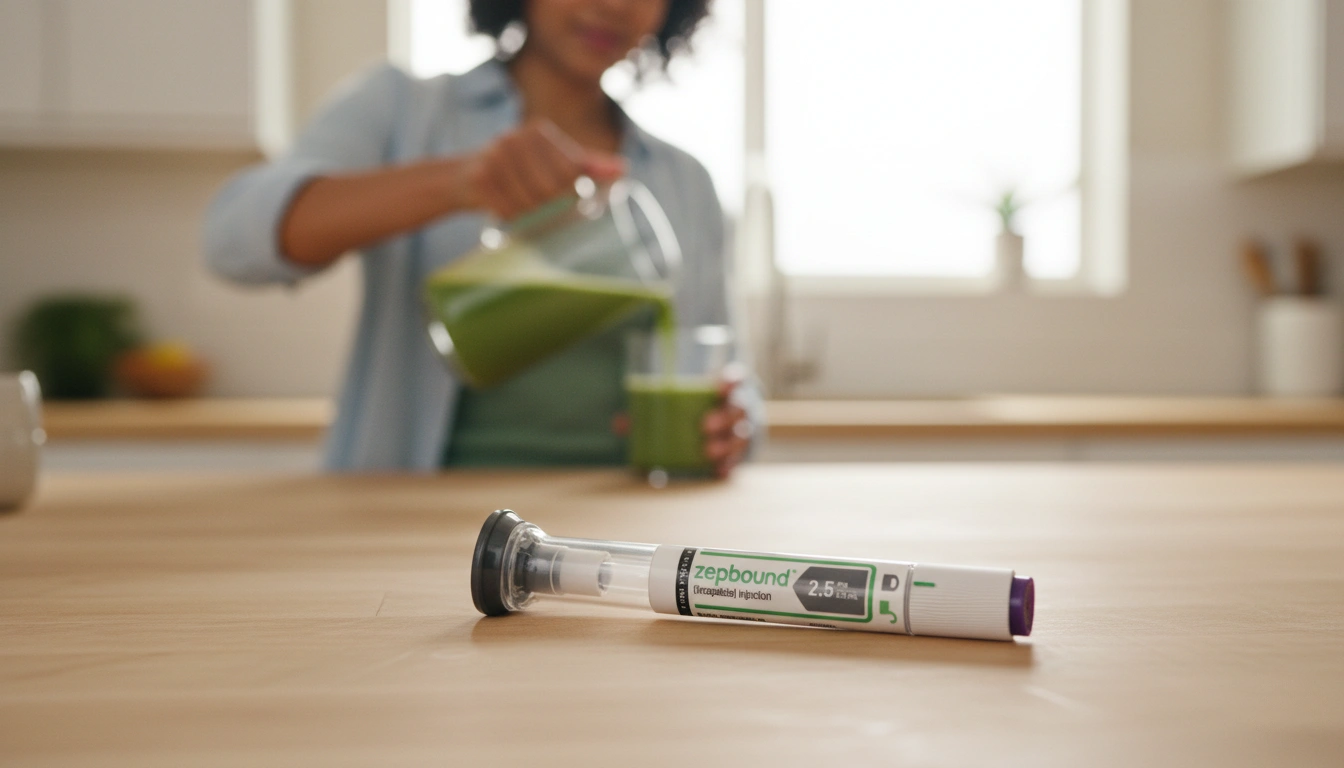Does Nausea from Zepbound Go Away? Understanding Side Effects and Management Strategies

Nausea is a common concern among individuals starting new medications, especially those designed for weight loss like Zepbound. In fact, studies suggest that nausea can affect up to 29% of patients using this medication. For many, this side effect can be a significant barrier to achieving their weight loss goals. But the good news is that nausea often diminishes as the body adjusts to the medication. In this blog, we’ll explore the various aspects of Zepbound, including its mechanism of action, common side effects like nausea, how long these side effects may last, and effective strategies for managing them.
At TrimRx, we are dedicated to providing safe, effective, and personalized weight loss solutions. Our journey started with a vision to help individuals embrace healthier lifestyles through medically supervised care and innovative telehealth services. With Zepbound and other weight loss medications, our goal is to support your journey toward sustainable weight loss.
Introduction
It’s interesting to note that for many individuals, the initial phase of a weight loss journey can be fraught with discomfort due to side effects from medication. Zepbound, an injectable medication used for chronic weight management, has proven effective for many, yet it is not without its challenges. Understanding the nature of these side effects—especially nausea—can empower you to manage them better and stay on track with your weight loss journey.
This blog post aims to provide a thorough understanding of Zepbound, focusing on the side effect of nausea. We will discuss why this side effect occurs, how long it typically lasts, and what strategies can help alleviate it. By the end of this post, you should feel more informed about your experiences with Zepbound and equipped with practical tips for managing any discomfort.
We will explore the following key areas:
- What is Zepbound?
- How does Zepbound work?
- Common side effects of Zepbound, particularly nausea.
- Why does nausea occur, and how long does it last?
- Strategies for managing nausea and other side effects.
- When to contact your healthcare provider.
By delving into these topics, we hope to provide clarity and support for those considering or currently using Zepbound as part of their weight loss treatment plan.
What is Zepbound?
Zepbound (tirzepatide) is a prescription medication designed to help adults with obesity or overweight manage their weight. It is administered through a subcutaneous injection, typically once a week, making it a convenient option for many individuals. Zepbound functions by mimicking hormones in the body that regulate appetite and glucose metabolism, thereby promoting feelings of fullness and reducing overall calorie intake.
This medication is often prescribed alongside a reduced-calorie diet and increased physical activity to maximize weight loss results. Importantly, Zepbound is intended for adults with a body mass index (BMI) of 30 or higher (obesity) or a BMI of 27 or higher (overweight) with weight-related health conditions, such as type 2 diabetes or hypertension.
How Does Zepbound Work?
Zepbound is classified as a glucagon-like peptide-1 (GLP-1) receptor agonist. This means it helps to stimulate the release of insulin while suppressing the release of glucagon (a hormone that raises blood sugar levels). By doing so, Zepbound aids in regulating blood sugar levels, which can be particularly beneficial for individuals with diabetes.
Additionally, Zepbound slows gastric emptying, which prolongs feelings of fullness after eating. This physiological response helps reduce hunger and, ultimately, caloric intake. However, these mechanisms can also lead to gastrointestinal side effects, such as nausea.
Common Side Effects of Zepbound, Particularly Nausea
While Zepbound is generally considered safe and effective, it can cause a range of side effects. Commonly reported side effects include:
- Nausea and vomiting: As noted, nausea is experienced by many patients, especially during the initial stages of treatment or when the dosage is increased.
- Diarrhea: A significant number of users report experiencing diarrhea when starting the medication.
- Constipation: Conversely, some individuals may experience constipation as their digestive system adjusts.
- Stomach pain and indigestion: Discomfort in the stomach area is another common complaint.
- Injection site reactions: Localized reactions such as redness or itching may occur at the injection site.
Understanding these side effects is crucial for managing them effectively, particularly nausea, which can deter individuals from continuing their treatment.
Why Does Nausea Occur, and How Long Does It Last?
Nausea is often a temporary side effect of Zepbound, particularly when starting the medication or increasing the dosage. The body may need time to adjust to the new medication’s effects on appetite regulation and digestion.
-
Adjustment Period: Nausea typically arises as the digestive system adapts to the slowed gastric emptying caused by Zepbound. This adjustment period can last anywhere from a few days to several weeks for most individuals. Many people find that their nausea subsides as their body acclimates to the medication.
-
Dosage Increases: If your healthcare provider increases your dosage of Zepbound, you might experience nausea again during this adjustment. It’s important to follow your provider’s guidelines regarding dosage changes to minimize discomfort.
Strategies for Managing Nausea and Other Side Effects
If you are experiencing nausea from Zepbound, there are several strategies you can employ to help alleviate this side effect:
1. Start with a Lower Dose
Healthcare providers often begin treatment with a lower dose of Zepbound to help your body adjust. By gradually increasing the dosage over time, you may reduce the likelihood of severe nausea.
2. Eat Smaller, Frequent Meals
Instead of consuming three large meals a day, try eating smaller, more frequent meals. This approach can help manage feelings of fullness and may reduce nausea by preventing your stomach from becoming overly full.
3. Avoid Trigger Foods
Certain foods may exacerbate feelings of nausea. Spicy, greasy, or rich foods are common culprits. Pay attention to your body and try to identify any specific foods that trigger nausea for you.
4. Stay Hydrated
Dehydration can worsen nausea. Ensure you are drinking plenty of fluids throughout the day, particularly water. Sipping on clear broths or herbal teas may also be soothing.
5. Consider Ginger or Peppermint
Natural remedies such as ginger tea or peppermint can be helpful in alleviating nausea. These remedies have been traditionally used for their calming effects on the stomach.
6. Rest and Relaxation
Sometimes, simply allowing your body to rest can help alleviate nausea. Engage in calming activities such as deep breathing, meditation, or light stretching to help relax your body and mind.
7. Consult Your Healthcare Provider
If nausea persists or becomes severe, it’s essential to reach out to your healthcare provider. They can assess your symptoms and may recommend adjusting your dosage or exploring alternative treatments.
When to Contact Your Healthcare Provider
While nausea is typically a manageable side effect of Zepbound, there are certain situations where you should reach out to your healthcare provider:
- If nausea persists beyond a few weeks or becomes debilitating.
- If you experience additional severe side effects, such as vomiting that prevents you from keeping food or fluids down.
- If you notice symptoms of dehydration, such as dizziness, dry mouth, or decreased urination.
- If you develop severe stomach pain, which could indicate more serious conditions like pancreatitis.
Being proactive in communicating with your healthcare provider can help ensure that you receive the appropriate care and support throughout your treatment journey.
Conclusion
Navigating the side effects of medications like Zepbound can be challenging, particularly when it comes to managing nausea. However, understanding the reasons behind these side effects and implementing practical strategies can empower you to continue on your weight loss journey with confidence.
At TrimRx, we are committed to supporting you through personalized care and tailored weight loss solutions. If you are considering Zepbound as part of your weight loss program, we invite you to take our free assessment quiz to see if you qualify for our prescription weight loss medications. Together, we can work towards your health goals, ensuring you have the resources and support you need to succeed.
FAQ
How long does nausea last when taking Zepbound?
Nausea typically lasts a few days to a few weeks as your body adjusts to the medication. If it persists beyond this period, consult your healthcare provider.
Can I take over-the-counter medications for nausea while on Zepbound?
Consult your healthcare provider before taking any over-the-counter medications, as they can provide guidance on what is safe and effective for you.
What should I do if I experience severe nausea from Zepbound?
If nausea becomes severe or debilitating, contact your healthcare provider for advice on how to manage your symptoms effectively.
Are there any foods I should avoid while taking Zepbound?
Spicy, greasy, or rich foods may exacerbate nausea. It’s best to focus on bland foods and smaller, more frequent meals.
How can TrimRx help me with my weight loss journey?
At TrimRx, we provide personalized weight loss solutions, including a comprehensive assessment to determine the best approach for your needs. Our supportive team is here to guide you every step of the way.
By addressing your concerns with Zepbound and its side effects, we hope you feel more empowered to take control of your weight loss journey. Together, let’s achieve your health goals!

Transforming Lives, One Step at a Time
Keep reading
Navigating Your Path: How Many Doses Are In Zepbound and What It Means for Your Health Journey
Curious how many doses are in Zepbound? Discover its weekly dosing schedule, available strengths, and titration process for effective weight loss. Learn more!
Navigating Your Zepbound Journey: Understanding Dosing and Expert Guidance
Wondering how to split doses of Zepbound? Learn why it’s unsafe & not recommended. Get expert guidance on Zepbound dosing for safe, effective weight loss with TrimRx. Click to learn more!
Understanding Zepbound Dosing: What is the Lowest Dose Available for Your Weight Loss Journey?
Curious what is the lowest dose of Zepbound available? Learn about Zepbound’s 2.5mg starting dose, titration, and safe use for weight loss. Get expert guidance!



